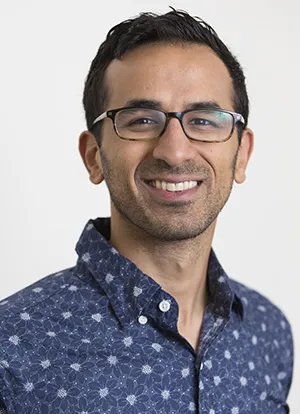Economist Syon Bhanot on Research that Improves People's Lives

A research group based out of the Massachusetts Institute of Technology that includes Swarthmore Assistant Professor of Economics Syon Bhanot made headlines recently with its study on a tech intervention to tame tuberculosis.
In the study, published in The New England Journal of Medicine in September, Bhanot and six colleagues demonstrated with a large field experiment in Kenya that a mobile-phone-based platform that included text-message reminders, motivational messaging, and other nudges significantly increased the likelihood that patients remembered to take their medication regularly and successfully finished their treatments.
The platform, developed by researchers in Kenya in collaboration with the digital health company Keheala, also fostered interactive communication between patients and providers and tapped insights from behavioral science to encourage to follow through on recovery regimens.
“The paper identifies a key health challenge, which is that even when medicines are available and free for treatment of disease, the problem is not fully solved. We are human beings who often fail to do what’s optimal for us,” says Bhanot, who was supported in the data analysis for the project by Reed Orchinik ’19.
“Life gets in the way, and people find it very easy to let their medication schedule slide, or to miss a few doses,” Bhanot adds. “In these cases, we need intelligently designed tools that use insights from social and behavioral science research to enhance and improve rates of treatment completion.”
Patients supported by the new platform—which also included wristbands to make people feel part of a larger group and reminders that taking the medication also protects families and friends—were two-thirds less likely to fail to complete treatment. That finding and the larger implications of how insights from the behavioral sciences can improve health outcomes drew coverage in The New York Times and SciTechDaily.
The published study, “Digital Health Support in Treatment for Tuberculosis,” is an offshoot of an ongoing research team of which Bhanot is a founding member: the Applied Cooperation Team, based out of MIT. The team works on real-world applications of social science insights regarding cooperation, testing the efficacy of interventions based on research findings from theory and behavioral lab settings in the real world.
This project, which follows Bhanot’s earlier research efforts in Kenya, came about through one of the team members knowing the founder of Keheala, Jon Rathauser. Bhanot contributed to the development of Keheala conceptually, and then helped design and implement the randomized controlled trial to test its impact and analyze the results.
Orchinik, who majored in economics at Swarthmore and is now a senior research analyst with the Federal Reserve Bank of New York, collaborated with Bhanot through a summer research grant from the Provost’s Office. He helped the team conduct much of the preliminary analysis as well as the final analysis that made its way into the paper.
“My first takeaway from working on this project is that collaboration is very important,” says Orchinik, citing the supportive efforts of Kate Musen ’18, an economics major at Swarthmore and now a predoctoral fellow at Harvard, who guided him along the foundations of statistical analysis.
“The second is that research can have real impacts on people’s lives,” he says. “It was really exciting to be involved in a project that was drastically improving health outcomes for the most at-risk people.”
Swarthmore is investing in its vibrant intellectual culture. Learn how at lifechanging.swarthmore.edu.



